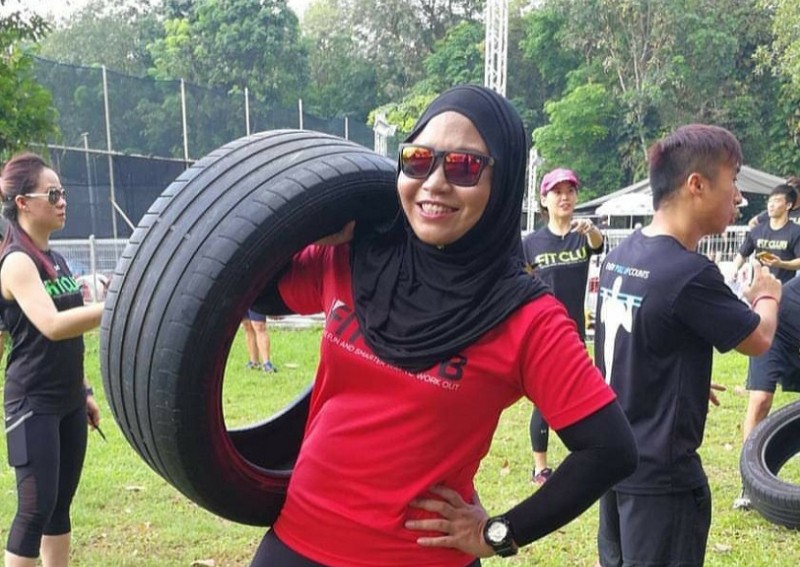Breast cancer at 33: 'My whole world felt like it was caving in'

When Nurhana Abdul Ghani noticed a lump on her right breast in 2017 during a routine self-check, the then-33-year-old didn’t worry too much and prayed that it wasn’t cancerous. After all, when she was 16, she’d found a lump too, in her left breast, but doctors told her it was benign and promptly removed it.
Over the next three months, when the lump in her right breast grew bigger, Nurhana sensed it might be serious. A biopsy, ultrasound and mammogram confirmed her worst fear – she had breast cancer.
“I couldn’t believe it,” Nurhana shares. “My whole world felt like it was caving in. So many feelings hit me at once: fear, anxiety, sadness and shock. All I could think about were my kids, who were nine years old and two years old at the time. I wondered if I would be around to see them grow up.”
Nurhana was diagnosed with Stage 2A cancer in September 2017. Her oncologist also checked her lymph nodes to make sure the cancer hadn’t spread; luckily, it had not.
Although her doctor was hopeful that chemotherapy would eradicate the cancer and that she would recover from the disease, Nurhana was still worried about the weeks and months ahead. But, instead of wallowing in the negativity, she made a conscious decision to stay strong and get through the treatment.
Nurhana underwent a mastectomy followed by 16 rounds of chemotherapy, which lasted several months. During this time she continued to work, taking days off only when the side effects from chemotherapy made it impossible for her to get out of bed.

“Sometimes, I’d be completely out of it for three or four days. My company was supportive and gave me the time I needed to heal. My family also helped me a lot – for instance, my mum would tell my kids to leave me alone while I was resting, and either my husband or aunty would accompany me to my treatments so I wouldn’t feel alone. Their love and encouragement kept me strong.”
One afternoon, Nurhana’s oldest child – her daughter – came home from school with a letter she’d written to her, asking why she was never around. Nurhana was heartbroken, and felt bad that she couldn’t be there for her.
“I sat my daughter down and explained what breast cancer was and reassured her that I would be fine. It was a tough conversation, because she wanted to know if she’d get breast cancer too when she was older.”
Now 37 years old, Nurhana says that she had days where she didn’t feel like going for chemo at the NCCS (National Cancer Centre Singapore).
But she pushed herself to finish the course and counted down to the moment when she could finally “ring the bell” (cancer patients all over the world to ring a ceremonial bell to celebrate the end of their radiation treatment or chemotherapy).

What also kept her hopeful was her Breast Cancer Foundation (BCF) support group. Her fellow breast cancer warriors encouraged and confided in one another on the messaging platform, WhatsApp.

Nurhana has been cancer-free now for a few years, and about a year after her final chemotherapy session she gave birth to her third child, a son. She says that having breast cancer and going through chemotherapy changed her for the better.
“I’m thankful to have survived this. Now that my treatment is over and I no longer have cancer, I feel stronger. The experience also made me realise how resilient I am and how much of a fighter I am. As difficult as it was, deep down I knew I could fight the disease. I’m so much more positive these days and feel like I can do anything.”
Nurhana stresses the importance of breast self-checks. According to the BCF, self-checks can help you get used to how your breasts normally look and feel and alert you to any changes when they occur (you can find out how to do a breast self-examination at https://www.bcf.org.sg/bse/).
Self-checks are recommended for women aged 20 onwards. Between the ages of 40 and 49 you should get annual mammograms, and from the age of 50, it’s recommended that you get a mammogram once every two years.
If she had not done a breast self-check in 2017, Nurhana may not have noticed the lump in her breast and the cancer may have progressed and worsened. She agrees that self-checks can save your life. “It doesn’t matter if you are young and feel healthy right now. Examine your breasts often and monitor any changes. Don’t think that breast cancer can’t happen to you.”
This article was first published in Her World Online.